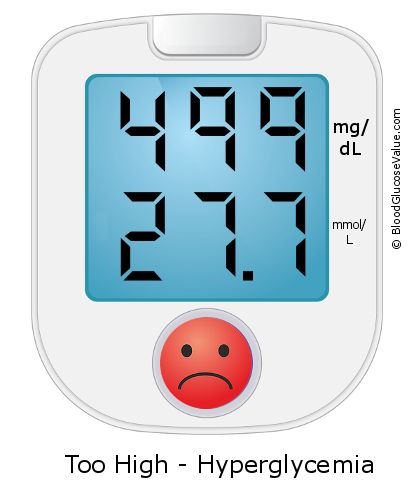A blood glucose test will measure the amount of glucose (sugar) in your blood. The amount is usually measured in mg/dL (milligrams (mg) per decilitre (dL)).
Sometimes, blood sugar is measured in mmol/L (Millimoles Per Litre). Your blood glucose level in Millimoles is 27.7 mmol/L.
Blood Sugar Test

499 mg/dL Blood Glucose - what does it mean?
For a Person With Diabetes
- Dangerous level of Hyperglycemia - your blood sugar is way too high. Your body obviously does not have enough insulin to control your blood sugar.
For a Person Without Diabetes
- Prediabetic if this blood sugar was tested fasting or after a meal
More Information
Blood glucose of 250 mg/dl or above is considered dangerously high and possibly life-threatening. Chronic insulin insufficiency is the main cause of this extreme form of hyperglycemia. Without insulin, the body is unable to use glucose for energy and ends up breaking down fats to provide fuel to the brain. The result is a build-up of excess ketones in the blood leading to a life-threatening condition called ketoacidosis in type 1 diabetics.
Signs of ketoacidosis are excessively dry mouth, dark urine, fruity breath odor, nausea, and shortness of breath. With blood sugar above 250 mg/dl, type 2 diabetics may develop hyperglycemic hyperosmolar nonketotic syndrome (HHNS) or lapse into a coma. Ketoacidosis and HHNS are complications that require emergency medical attention to prevent diabetic coma or a fatality. Additionally, persistently high blood sugar can cause liver or kidney damage, intestinal problems, reduced vision, and slow-healing cuts and sores.
